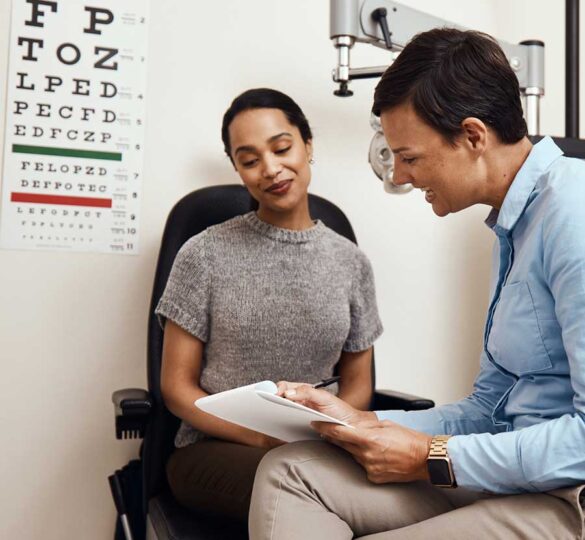Working with Your Doctor to Manage Your Glaucoma
It is important that your doctor listens and responds to your concerns and questions, is willing to explain your treatment options, and is available for calls and checkups.

If you do not feel confident and comfortable with your doctor, or at any point in your care, remember you always have the right to seek a second opinion. Effective treatment starts with a good working relationship with your eye doctor.
Tips for Working with Your Doctor
- Keep a good record of your appointment date and time, and make sure you have enough time planned for the visit. Go for a checkup before you go on a long trip or start a long-term project.
- Write down any questions you have about your eyes, vision, or medications before you see your doctor. During your checkup, bring this list of questions, and write down your doctor’s answers.
- Let your doctor know if, for any reason, your medications are not working for you or if your daily routine has changed. Your doctor may be able to solve such problems by changing the type or timing of your medications.
- Bringing a friend or family member along to your appointment as a second set of ears can help you capture all the details from your visit. This can be especially helpful early in your diagnosis.
- Report any new symptoms to your doctor such as redness, irritation, itching, tearing, or decreased vision. Symptoms that you have may be related to the disease or to side effects or complications of medication or surgery.
- Bring all of your medications and an updated list to your appointment. This not only allows your doctor to see what you are currently using and how often but also allows you to check the need for refills. Be honest about how regularly you have been taking your eye drops, as this may influence treatment decisions. Any new medication added by other doctors should be mentioned to your glaucoma doctor.
- It is important to leave your doctor’s office with a clear understanding of whether things are remaining stable or possibly getting worse, or if additional testing is required. Make sure you have the information you need. Details can be hard to remember. Ask the doctor to write out the treatment plan in large clear letters and, if necessary, color code the medication and instructions.
- Schedule your next appointment before you leave the doctor’s office and put the appointment on your calendar.
- Use the medical support team. Trained staff at your doctor’s office, such as technicians and nurses, can be an enormous support to helping you manage your disease. These knowledgeable professionals can often give you the information, time, and attention that can make a big difference.
With these tips, going to see your glaucoma doctor can not only be less stressful but also more productive. Having the right outlook can strengthen your patient-doctor partnership for providing you the most beneficial care.
Responding to Vision Changes Due to Glaucoma
Some people with glaucoma have “low vision.” Low vision means there may be problems doing daily, routine things even when wearing glasses or contact lenses. With glaucoma, this can include loss of contrast sensitivity (the ability to see shades of the same color), problems with glare, light sensitivity, and reduced visual acuity (the ability to see fine details).
A variety of products and resources are available to help people who have low vision. Examples include magnifiers, colored lenses, computer text enlargers, and apps for voice to text and text to audio. If you have concerns about low vision, help is available. Discuss your concerns with your doctor.
Reviewed on April 1, 2022